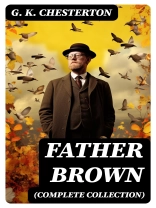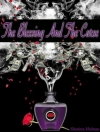‘Father Brown (Complete Collection)’ by G. K. Chesterton is a compendium of detective stories featuring the eponymous cleric-detective who employs keen intuition and profound understanding of human nature to solve crimes. Chesterton’s distinctively whimsical yet incisive prose style illuminates these narratives, merging elements of mystery with philosophical inquiry. Each story intricately explores themes of morality, faith, and the human condition, offering readers not only puzzles to unravel but also deep reflections on the complexities of good and evil, underscored by Chesterton’s belief in the redemptive potential of every individual. G. K. Chesterton, an influential English writer, philosopher, and lay theologian, drew on his rich experiences and keen observations of society to craft the Father Brown stories. His own spiritual journey and engagement with religious themes profoundly shaped his characterizations and narratives. Chesterton’s background in journalism and literature also enabled him to weave social commentary seamlessly into thrilling plots, making his work resonate with both contemporary and modern audiences. This complete collection is a must-read for enthusiasts of detective fiction and those interested in the intersections of faith and morality. Chesterton’s wisdom and wit make these tales timeless, inviting readers to ponder deeper existential questions while enjoying the thrill of the chase. Prepare to be captivated by Father Brown’s insightful deductions and the heartwarming humanity that permeates each story.
Про автора
G.K. Chesterton, born Gilbert Keith Chesterton, on May 29, 1874, in Kensington, London, is revered as one of the most multifaceted English writers of the early 20th century. His intellectual arsenal encompassed a broad range of subjects, as he triumphed as a novelist, critic, journalist, poet, and Christian apologist. Acclaimed for his wit, clarity of thought, and mastery of paradox, Chesterton’s work remains influential in both literary and theological circles. His most famous creation, the ‘Father Brown’ series, showcases his narrative prowess and his ability to intertwine astute psychological insights with themes of faith and moral complexity. This collection, with its endearing and intellectually formidable Catholic priest who moonlights as an amateur sleuth, has delighted generations of readers and inspired numerous adaptations. Beyond his fictional endeavors, Chesterton’s apologetic writings, such as ‘Orthodoxy’ (1908) and ‘The Everlasting Man’ (1925), offer spirited defenses of Christian thought, countering contemporary skepticism. His literary contributions and thought-provoking critiques of modernity carved out a unique space for Chesterton in a rapidly changing world, as his resilient belief in the transcendent brought light to the tumultuous cultural shifts of his time. Chesterton’s impact spans beyond his death on June 14, 1936; he continues to be a cherished figure for readers seeking wit, wisdom, and a timeless contemplation of life’s enduring mysteries.












